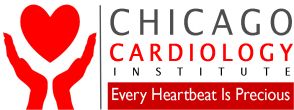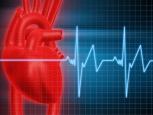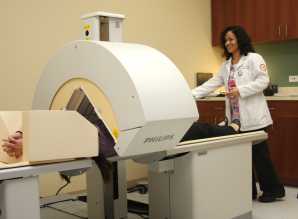Explanation
A nuclear stress test is a procedure that is done in our office usually takes about 3 hours to complete.
This test allows us to see the difference in how your works when resting and when it has been
exercised (stressed). The test is done in four stages. You will be required to drink water during the
study.
Stage1: Begins with an injection of a trace amount of a radioactive material into your bloodstream
which is then allowed to circulate for about an hour.
Stage 2: The second stage will require you to lie down on a bed where a highly specialized camera
tracks the material as is flows through the muscles of your heart.
Stage 3: The 3rd stage will be the stress portion of the test. This portion can be done in 2 different
ways.
Physical: Exercise on a treadmill which will cause your heart to pump harder. We need to make sure
that your heart rate gets to at least 85% of maximum capacity for your age. It is called a "stress" test.
Chemical: If you are unable to physically exercis to the required limit, an injection can be used
composed of a chemical agent which causes your heart to simulate exercise.
When your heart rate achieves the desired range, you will receive another injection of the radioactive
material which will again be allowed to circulate for an hour.
Stage 4: The fourth and final phase will have you lying down again for an additional set of special
pictures as the trace radioactive material flows through the heart muscle.
These images at rest are compared against the images after exercise to see if there is any impairment
in the function of the heart when a greater demand is placed on your system.



CHICAGO CARDIOLOGY INSTITUTE
"The premier center for the treatment of Cardiovascular and Peripheral Vascular disease"




New Peripheral
Intervention
Center
Intervention
Center


Nuclear Stress Test
Definition
Your heart is a muscular organ that is responsible
for pumping the blood through your entire body
through vessels called arteries and veins. The
arteries carry the fresh oxygenated blood from the
heart and the veins bring the blood back to your
heart. The heart is composed of muscle and usually
has four chambers and four valves. The heart has
an electrical system and a pumping system. In order
for the hear to work properly, it is fed by an arterial
system which supplies blood to the heart muscle
itself. Problems may develop in the electrical and
pumping portions which can be diagnosed with a
nuclear stress test.
Preparation
Due to the advanced nature of the test, specific preparations are required. Failure to follow the instructions may require the test
to be rescheduled and a cancellation fee may be charged.
Nuclear Stress Test Instructions - You can download the instructions clicking here ->
Your Doctor may require a nuclear stress to see if there are any abnormalities present and which
treatment options may be necessary. A stress test may also be required prior to having surgery.
Place mouse pointer over images to zoom in.
• No eating for 4 hours prior to the Nuclear Stress Test. You may drink water.
• Please take ALL medications with water the day of the test EXCEPT Beta Blockers, Theophylline and Nitroglycerin with
water the day of the test. Beta Blockers, Theophylline and Nitroglycerin (patch or tablet) should be held the morning of
the test unless instructed otherwise by your Physician.
• NO CAFFEINE for 12 hours prior to the test (Examples: coffee, tea (including decaffeinated coffee or tea), soda, Excedrin and
chocolate products).
• If you are diabetic, DO NOT take full dose of insulin or diabetic pills before the test. For further instructions regarding
dosing of diabetic meds, please consult your Physician.
• If you wear a Nitroglycerin patch, DO NOT put one on the morning of the test.
• No smoking 12 hours prior to the test. This includes Nicotine gum or patches.
• Please wear a comfortable two piece outfit, and if having an exercise test, shoes suitable for walking/running on a treadmill.
The top of your outfit should not have any metal buttons or metal zippers.
• Please DO NOT apply any lotions or oils on the day of the test.
• Bring a list of your medication with you the day of the test.
• Due to the high cost and expiration of the radioactive material, we ask that you call 24 HOURS prior to your scheduled test to
cancel/reschedule your appointment. (There will be a $200.00 charge if test is not cancelled 24hr prior to schedule time.)
Please call your Physicians office with any additional questions.
• Please bring your Physician’s order and Insurance cards with you the day of the test.
• Please arrive 10 minutes prior to your appointment time to register and allow 3 hours for the entire test to be completed.
*** Common Beta Blockers:
Metoprolol (LoPressor, Topral XL), Atenolol (Tenormin), Carvedolol (Coreg), Propraolol (Inderal),
Acebutolol (Sectral, Monitan), Labetalol (Normodyne, Trandate), Nadolol (Corgard)


